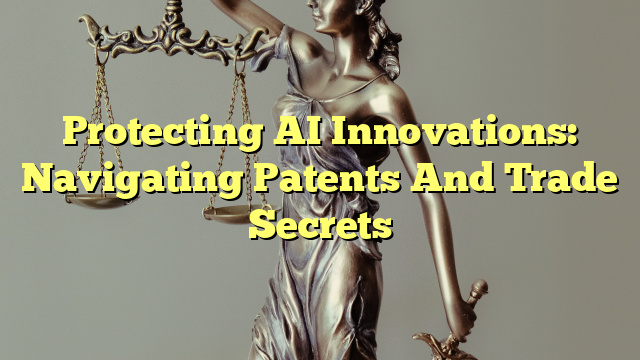Table of Contents
1. Protecting AI Innovations as Trade Secrets
Trade secrets can be a viable option for protecting AI-based technologies. By keeping the details of the AI algorithms and models confidential, companies can maintain a competitive advantage. However, trade secrets require strict measures to ensure confidentiality and can be challenging to enforce.
2. Protecting AI Innovations with Patents
Patents provide strong protection for AI innovations by granting exclusive rights to the inventor. However, obtaining a patent for AI technologies can be complex due to the requirement of novelty, non-obviousness, and enabling disclosure. Additionally, the fast-paced nature of AI development may pose challenges in keeping up with patent filings.
3. Copyright Protection for AI Innovations
Copyright can protect the expression of AI innovations, such as the source code or user interface. However, it does not protect the underlying ideas or algorithms. Copyright can be a useful complement to other forms of protection, but it may not be sufficient on its own.
4. Challenges in Protecting AI Innovations
Protecting AI innovations poses unique challenges due to the rapid advancement and complexity of the technology. Some challenges include:
- Difficulty in defining the boundaries of AI inventions
- Ensuring compliance with patent eligibility requirements
- Addressing ethical considerations in AI development
- Managing the risk of reverse engineering or misappropriation
Is it better to protect AI-based technologies as trade secrets?
Protecting AI-based technologies as trade secrets can be advantageous in certain situations. It allows companies to maintain control and exclusivity over their innovations without disclosing them to the public. However, trade secrets require strict confidentiality measures and can be challenging to enforce.
How can we protect innovation and intellectual property?
To protect innovation and intellectual property, companies can employ a combination of strategies:
- Implementing robust trade secret protection measures
- Filing for patents to secure exclusive rights
- Using copyright to protect expression and user interfaces
- Implementing contractual agreements with employees and partners
- Monitoring and enforcing intellectual property rights
How can we protect intellectual property from AI?
Protecting intellectual property from AI requires a proactive approach. Some strategies include:
- Implementing access controls and encryption to protect sensitive data
- Monitoring and detecting unauthorized use or access to intellectual property
- Implementing robust cybersecurity measures to prevent data breaches
- Regularly updating and patching AI systems to address vulnerabilities
- Ensuring compliance with relevant laws and regulations
Can AI systems be protected by intellectual property law?
Yes, AI systems can be protected by intellectual property law. Depending on the nature of the innovation, companies can seek protection through patents, trade secrets, or copyright. However, the specific requirements and challenges associated with each form of protection should be carefully considered.

